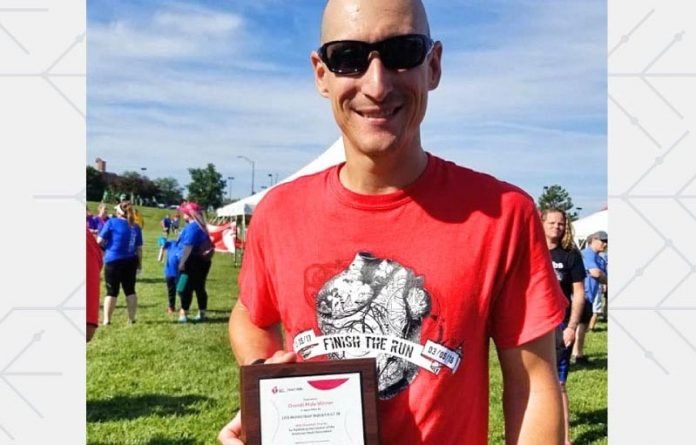
At 13, Chad Lorenz’s life revolved around sports. There was flag football in the fall, basketball and ice hockey in the winter, and track and field in the spring.
During basketball practice, he found himself short of breath and struggling to keep up.
He struggled enough that his parents took him to the doctor. The expert’s advice: He should never again play sports.
Chad was diagnosed with a condition called aortic stenosis. It means his heart’s aortic valve, the opening through which blood flows from the heart to the rest of the body, didn’t properly form at birth.
The doctor said he would be fine as long as he didn’t push his heart. Devastated, Chad largely followed doctor’s orders.
In his late 20s, Chad was living in Kansas with his wife and their daughter, Autumn. After so many years without heart problems, he decided to give running a go again.
“I didn’t want Autumn to grow up living a sedentary life,” he said. “I thought the best way was to lead by example.”
Chad laced up his sneakers and headed out for a 3-mile run.
“I made it about a mile,” he said. “I kept doing it until I actually started feeling really good.”
He and a friend found a short race to do together. Pushing himself felt good.
“All of a sudden, the fire I’d put out when I was 13 came back blazing,” he said. “Maybe in my mind I was hoping I could beat out of me whatever I’d had.”
Four years later, in 2014, Chad’s job required a physical exam. Because of his medical history, he had an echocardiogram.
The next year, the doctor told Chad the results were worse than the year before, which were already bad.
A cardiologist ran a battery of tests and was puzzled that someone with a heart as bad as his could perform so well.
“It was like he’d been training in high elevation,” his wife, Laura, said. “He had conditioned himself to work that much harder.”
Chad was referred to a medical center in Kansas City. When he and Laura arrived for the appointment, a surgeon entered the room instead of the cardiologist they’d expected.
He told Chad that he needed open-heart surgery to replace the defective valve. Chad opted for a mechanical one.
“After the appointment, we got in our car and looked at each other and said, ‘What just happened?'” Laura said.
The surgery went well, but recovery was tough, even for a well-conditioned 33-year-old.
It was “six months of awfulness,” Chad said. His journey included depression and an unrelated problem in his back that required surgery.
He returned to running after six months but didn’t feel the immediate improvement he expected.
In 2017, 20 months after open-heart surgery, Chad was 9 miles into a 10-mile run when his heart began racing and he felt lightheaded.
The next thing he remembers is waking up in the hospital hooked up to machines. He’d had a heart attack; his left main artery was 99% blocked. Doctors believe the blockage came from scar tissue from the valve surgery.
The heart attack caused Chad to go into cardiac arrest. Luckily, a couple saw him fall. They performed CPR until first responders arrived.
As Chad recovered from the heart attack, he finally understood the difference people had been talking about.
“When I got onto the cardiac rehab treadmill, I felt the best I’d ever felt in my entire life,” he said.
A year later, Chad, his family, a group of friends and the couple who performed CPR gathered to run FTR, or Finish the Run. They completed the final mile he hadn’t the year before.
Not only did Autumn catch the running bug, she’s started throwing the javelin. She won a medal in the Junior Olympics. Chad, or “Coach Dad” as she calls him, coaches junior track and field and formed a track club in their hometown.
Chad ran in the American Heart Association’s Wichita Heart Walk & F.A.S.T. 5K in both 2018 and 2019. Last year, he won the overall male category. (The 2020 event was virtual.)
“Now that I’m really feeling good, I’m getting back into sprints,” he said. “Before I’m 40, I want to break the 2-minute mark in the 800. That would rank me nationally at my age level.”
Written by Diane Daniel.
If you care about heart health, please read studies about the best blood sugar levels to prevent strokes, heart attacks, and Vitamin K may lower your heart disease risk by a third.
For more information about heart health, please see recent studies about why obesity increases heart damage in COVID-19, and results showing this drug combo can halve your risk of heart attack, stroke.



